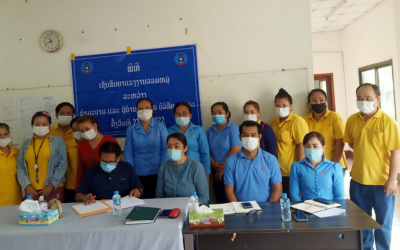Laos is considered one of the world’s Least Developed Countries, according to the United Nations. However, the country has been striving to achieve middle-income status by 2026 and has seen a significant increase in the private sector. Despite this growth, workers in Laos still face many challenges. In its recent Global Labour Rights Survey, the International Trade Union Confederation categorised Laos as a country where “there is no guarantee of rights for workers”.
The people of Laos are currently struggling with a severe economic crisis. The cost of essential items such as food, medical care, and transportation keeps rising, as the inflation rate has increased from 25.6% to 41.3% in the past 12 months. Many people in Laos don’t have savings, and the value of their currency, the Lao Kip, has decreased. This, combined with a dependence on imported goods, makes it difficult for most people to meet their basic needs. Moreover, the country’s focus on capital-intensive industries like mining, energy, and construction, has not generated enough jobs for the local workforce. As a result, unemployment is high, and most available jobs pay low wages and provide insecure working conditions.
Since the beginning of 2020, Laos has experienced the return of approximately 260,000 migrant workers due to the COVID-19 pandemic. These workers joined the large number of people who were already losing their jobs in the country. As a result, the unemployment rate in Laos reached about 20%. Additionally, the efforts of the Laos Federation of Trade Unions (LFTU) to organise workers and improve their conditions were hindered by the pandemic and the control measures put in place to contain it.
Organising in the private sector
Laos and Australia recently celebrated 70 years of diplomatic relations, marking the longest unbroken diplomatic relationship Laos has had with any country. Since mid-2018, Union Aid Abroad – APHEDA has been supporting the LFTU project called “Decent Work – Organising the Private Sector” in Laos. Despite the challenges posed by COVID-19, the LFTU has made significant progress in the past three years. They have trained 54 staff members, including 25 women, at various levels of the LFTU, who provide ongoing training and support to 83 grassroots organisers. These organisers have successfully recruited 2,868 private sector workers as members and established 107 new enterprise-level unions. Furthermore, they have finalised 26 collective bargaining agreements that provide better conditions for workers than what is required by labour laws.
Last year, the LFTU continued its efforts to educate and organise workers. They visited 47 workplaces, established 17 new enterprise-level unions, trained five enterprise-level unions in organising, recruited 961 new members (including 589 women), and signed five new collective bargaining agreements while improving an existing one.
Collective bargaining agreements
According to the fourth Five-Year Development Plan (2021-2025), there are nine programs and 51 projects aimed at enhancing the effectiveness of trade unions in Laos. The focus is on organising trade unions in the private sector to protect workers by establishing collective bargaining agreements. The goal is to recruit 20% of workers in the private business sector and 10% in foreign investment businesses as union members. Additionally, they aim to train and upgrade the skills of trade union staff, with 70% of trade union officers and 50% of semi-trade union officers having the necessary knowledge and abilities. Other objectives include promoting the establishment of collective bargaining agreements in 55% of workplaces, ensuring occupational safety and health in 60% of workplaces, facilitating health checks for 80% of workers, and monitoring and supporting the implementation of the minimum wage.
Sustainable Development Goals
The LFTU has developed a draft plan for a three-year project. This plan takes into account the priorities outlined in the LFTU’s current strategic plan. The purpose of this project is to support the LFTU in fulfilling its role and contributing to the United Nations’ Sustainable Development Goals in Laos, specifically focusing on three goals:
Goal #1: NO POVERTY: This goal aims to eliminate poverty in all its forms and everywhere.
Goal #8: DECENT WORK & ECONOMIC GROWTH: The objective here is to promote sustainable, inclusive, and long-term economic growth, as well as to ensure full and productive employment and decent work for all individuals.
Goal #9: INDUSTRY, INNOVATION & INFRASTRUCTURE: This goal involves building resilient infrastructure, fostering inclusive and sustainable industrialisation, and encouraging innovation.
The project will support the LFTU in working towards these goals and making a positive impact on sustainable development in Laos.
